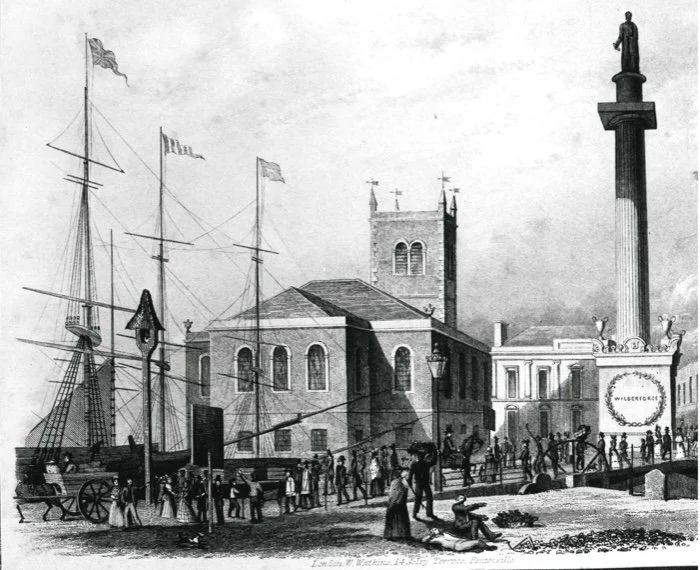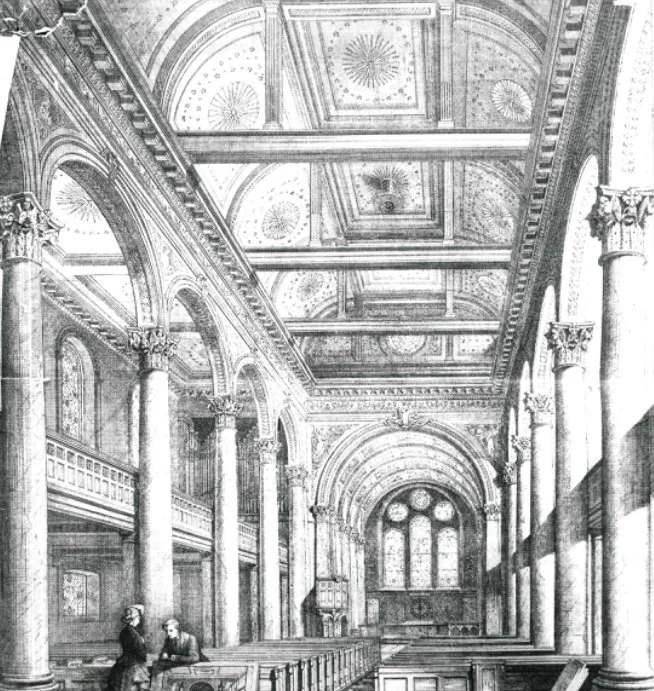Musical legacy: The composer whose maritime hymn is sung across the world
HOLY WATER: The floating chapel on what was Queen’s Dock
Now & Then, a column by Angus Young
The story of John Baccus Dykes, whose music outlived the churches founded by his family
The seafarer’s hymn Eternal Father has a special link with Hull.
As well as being a traditional highlight of the annual Lost Trawlermen’s Day service held in the city, the music for the hymn was also originally written by prolific Hull-born composer John Baccus Dykes.
Like many leading figures in Hull’s history, the sea played a big part in Dykes’ early life and his family.
His father William was born in the parish of Sculcoates in 1792 – the same year as a new church both founded and funded by his father Thomas was consecrated.
Having inherited a large fortune, Thomas Dikes (the ‘i’ in the family surname was later changed to ‘y’) used some of the legacy to build St John the Evangelist Church.
PROLIFIC: John Baccus Dykes
Rental income from pews offered to wealthy members of the congregation were intended to cover his initial investment, but a funding gap was only eventually closed with the help of additional private subscriptions.
It was one of the first significant buildings to be constructed outside Hull’s old town walls and stood next to what had been a defensive moat. The unstable ground conditions would later cause considerable problems with the vaults.
His determination to build a new church had been supported by William Wlberforce who, like Thomas Dikes, was an Evangelical Anglican. Partly because of this patronage, it quickly became known for Dikes’ sermons supporting the abolition of slavery.
The church would become central to the story of the family with Thomas’ son William initially groomed to follow in his father’s footsteps by becoming a pastor.
However, instead of becoming a clergyman William decided to forge an early successful career in shipbuilding and quickly became director of a company with a yard on the River Hull specialising in whaling ships.
LANDMARK: St John the Evangelist Church on what is now the site of Ferens Art Gallery
The firm’s most famous whaler, William Lee, was immortalised in a number of paintings by famous Hull maritime artist John Ward.
William and his growing young family lived close to the shipyard, initially in Lime Street before moving to a larger property in Dock Street next to The Dock, later to be known as Queen’s Dock.
Like his father, William was a strict Evangelist and his children, including young John, had a relatively spartan upbringing with plain food, cold water baths, long walks and strict attendance at church.
William’s religion and passion for social reform led him to establish a Sunday School for poor children in the New George Street neighbourhood, becoming its superintendent and teaching there every week.
In 1821 he also helped found the Port of Hull Society for the Religious Instruction of Seamen. Originally intended for those who served during the Napoleonic Wars, its aim was to establish a moral code for seafarers as well as supporting their families.
The society opened a floating chapel onboard a former Dutch merchant ship named The Valiant moored in The Dock. Inside the hulk of the vessel, there was space for up to 500 men to attend regular services.
Seven years later William helped found the Mariners’ Church Society and bought an old chapel in Dagger Lane with the intention of replacing it with a brand new church for mariners, which opened a year later.
His son John was born in 1823 and would have spent much of his early years in the churches founded by his father and grandfather surrounded by the bustle of a busy port. It must have been an intoxicating environment.
Having a musical father who played the flute and the French horn and was also an accomplished tenor would prove to be another huge influence on the young boy who quickly learned to play the violin and piano.
However, he loved playing the organ most of all and by the age of ten he was an organist at his grandfather’s church, which now wedged between The Dock and the recently-opened Junction Dock, later to become known as Princes Dock. His first compositions were aired in the church’s Sunday School.
LEGACY: Thomas Dikes, whose founding of a new church was supported by William Wilberforce
By then, his father William had moved into banking by becoming the manager of the Hull branch of the Yorkshire District Bank. The appointment meant another move for the family, this time relocating into the Bank House in Lowgate opposite St. Mary’s Church.
Young John’s education in Hull continued at Kingston College in Beverley Road until his father uprooted the family once again in 1841 by taking on the role of manager of the bank’s Wakefield branch.
Within a few years, John went to Cambridge University to study classics and help found the university’s Musical Society. After graduating he was ordained as a priest and went on to serve in various clerical and musical roles mainly in the North-East, including a spell as organist at Durham Cathedral.
During his career he published many sermons, articles and anthems but is best known for composing more than 300 hymn tunes published from 1857 onwards.
Many of them are still sung today, including Eternal Father which is now the adopted hymn of the United States Navy.
PLACE OF WORSHIP: The interior of St John the Evangelist Church
His music has certainly outlasted the churches founded by his grandfather and father.
St. John the Evangelist Church closed in 1917 after its congregation dwindled when the city’s population shifted into its new suburbs. The church was eventually demolished to create a site for the Ferens Art Gallery.
The Mariners’ Church in Dagger Lane remained in use until 1906. It was later converted into a warehouse and demolished in 1978 to make way for new housing.
However, the legacy left by William Dykes with his society supporting seafarers also lives on in the shape of its modern day successor, the Hull-based Sailors’ Children’s Society.
Become a Patron of The Hull Story. For just £2.50 a month you can help support this independent journalism project dedicated to Hull. Find out more here







